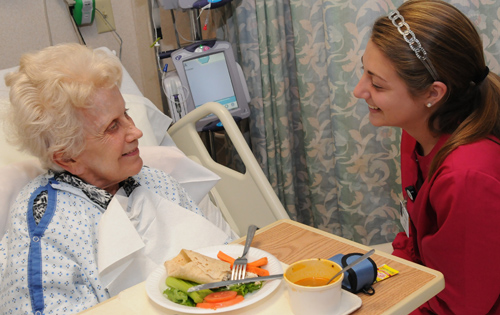Volunteer SPOONS program promotes patient nutrition and companionship


A revitalized volunteer program is providing nutrition and companionship to patients and a much-appreciated helping hand to nurses and support staff. Volunteers in Christiana Care’s SPOONS Program (Support for and Promotion of Optimal Nutritional Status) help patients at mealtimes by feeding them, cutting up their food and assisting as needed or sitting by as a dining companion. It makes for a safer and more pleasant mealtime experience for patients and frees up nursing staff to attend to other tasks.
A similar program operated at Christiana Hospital in the late 1990s has been brought back, says Margarita Rodriguez- Duffy, director of Visitor and Volunteer Services. Nurse Aliesha Rivera, RN, BSN, B-C, was unaware of the earlier program, but learned about SPOONS at a conference last year and suggested starting it up at Wilmington Hospital, where she works on the 4th floor medical and stroke unit. With help from the nursing staff, volunteer office, speech pathology and food services, and input from risk management and legal services, a specialized volunteer training program was developed, and a pilot program started in January. It was expanded to Acute Care of the Elderly (ACE) units at Wilmington and Christiana Hospitals throughout the spring and summer, and this fall, volunteers are needed for SPOONS training at both hospitals.
“The main goal is to improve nutrition,’’ Rivera said, but there are other benefits. The program is cost-effective, helps reduce length of stay and improves the hospital experience for patients.
“Eating is such a social activity in everybody’s life,’’ said Linda Sydnor, MSN, CNS, B-C, geriatric clinical nurse specialist at Christiana Hospital. During the summer, with up to 10 college student volunteers participating, “it was helpful to many of our patients. They were able to have somebody to talk to,’’ she said.
Saba Ali, a pre-medical student at the University of Maryland, volunteered with SPOONS last summer and is looking forward to returning over her winter break. Most rewarding is “the sheer joy and gratitude the patients expressed for just having someone to talk to them,’’ she said. “The nurses appreciate us, too, and we really learned to appreciate them and what they do.’’
When a volunteer reports to the unit, the charge nurse identifies patients in need of assistance who qualify for volunteer visits. Those who have trouble swallowing or are in isolation are not eligible. Volunteers are trained to wash their hands, don gloves, introduce themselves to the patient and explain why they’re there. They also document the visit, recording time, room number and length of stay.
It can take an hour to feed a patient, says Denise French, MSN, RN, APRN, BC, geriatric clinical nurse specialist at Wilmington Hospital. French hopes SPOONS can expand to other units, but more volunteers are needed, especially those like Debbie Anthony, 44, who comes in for two or three four-hour shifts in Wilmington’s ACE unit each week. Anthony, who used to work at a nursing home, says that volunteering is a blessing.
“I love the older population.” Anthony said. “I can relate to them. I’m in a wheelchair myself — I’m a double amputee — and I understand what it’s like to be in a hospital, to be frustrated and not able to do what you used to.’’ She helps patients with their meals, provides pleasant company, and offers newspapers or a game of cards. But sometimes, she says, all they need is just someone to talk to.’